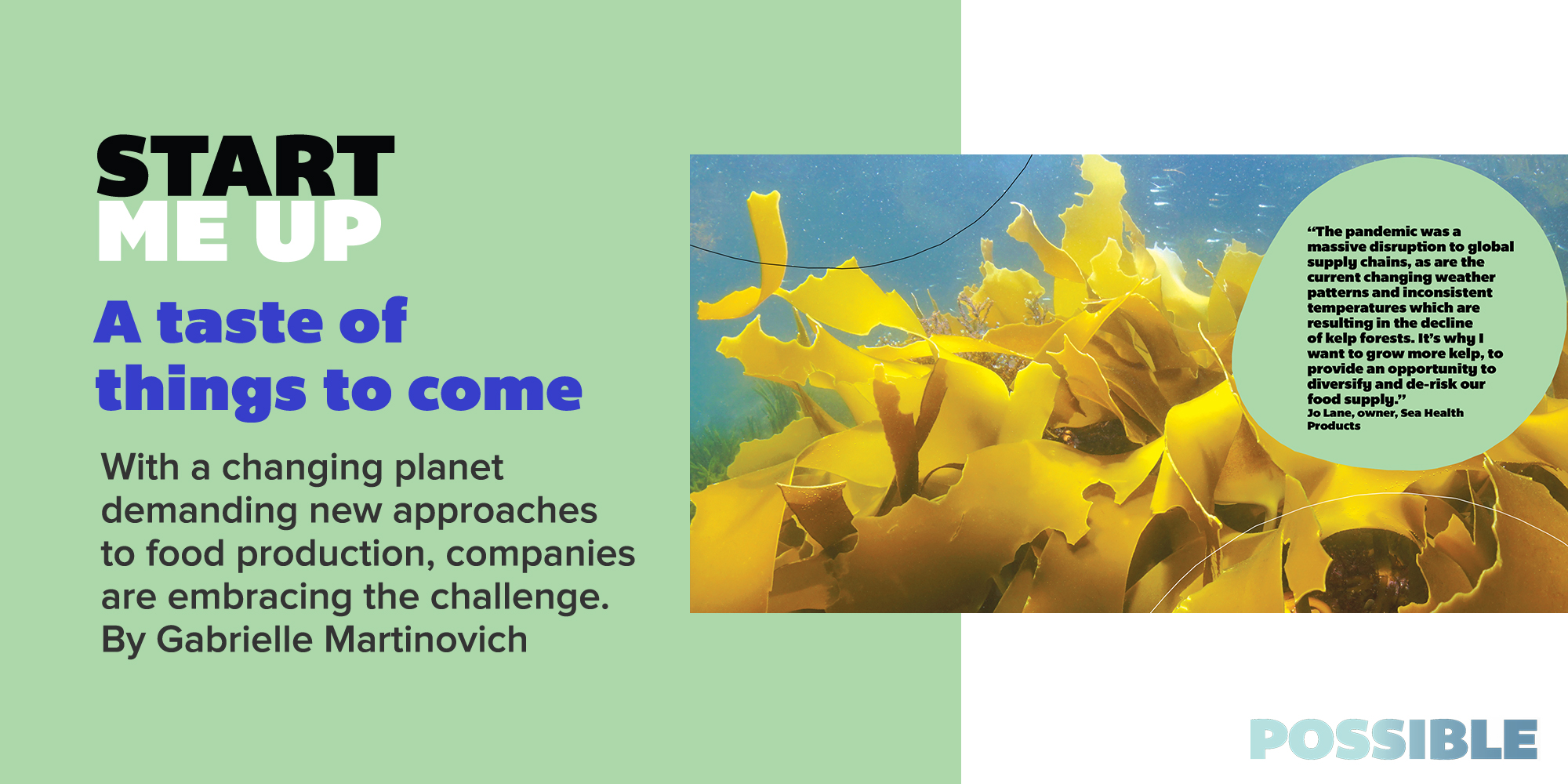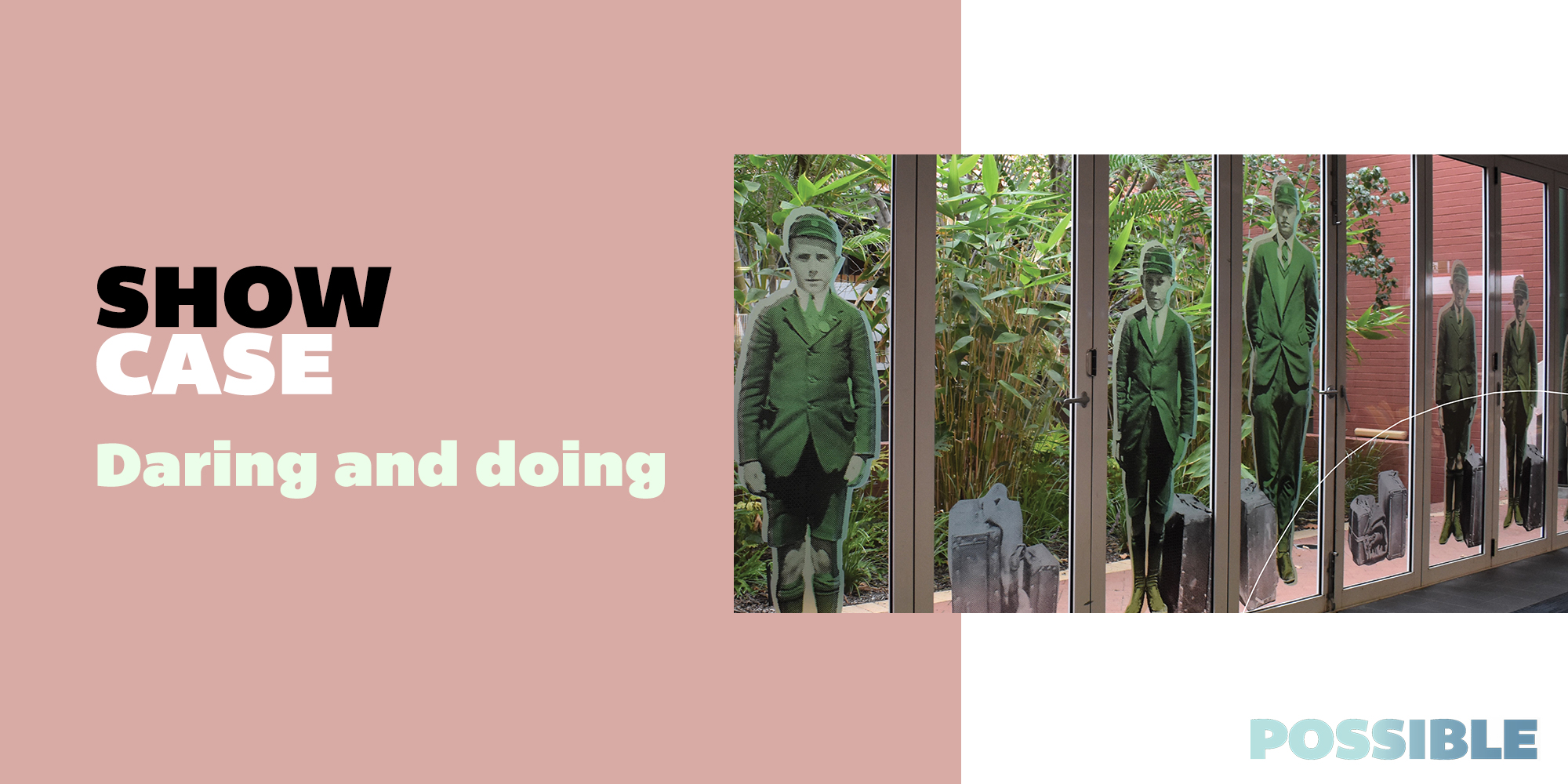With a changing planet demanding new approaches to food production, companies are embracing the challenge. By Gabrielle Martinovich

A growing body of evidence shows an overhaul in food production and consumption is needed to feed 10 billion people by 2050. But that needs to go hand-in-hand with halting and reversing ecosystem and biodiversity loss, safeguarding our oceans and reducing food waste.
Closing this gap requires the restoration and regeneration of food systems. Experimentation with seaweed and coffee fruit has led startups Sea Health Products and I Am Grounded to tackle these challenges while delivering ecologically sustainable and nutritious food.
With a growing amount of food alternatives populating supermarket shelves today— catering to an Australian market of approximately 30 per cent of people swapping out meat-based for plant- based meals—these new products not only work with nature, they taste good as well.
All at sea
For ‘kelp lady’ Jo Lane, biodiversity is at the heart of Sea Health Products’ mission. She and her team hand-harvest Ecklonia radiata (golden kelp) from the pristine waters off the far South Coast of NSW to produce a unique—and award-winning— range of seasonings and skincare products.
“Golden Kelp is incredibly versatile and can be added to a range of foods. It is high in macro and micronutrients, and is a flavour enhancer,” says Lane.
The sea kelp (seaweed) is ground down to a fine powder which can be used in cooking as broth or seasoning.
“Beyond food, seaweed can be used in the production of agricultural feed, fertiliser, cosmetics, pharmaceuticals, bioplastics and building materials,” she adds.
In Lane’s business, 35 per cent of the kelp goes to wholesale production, while the remaining 65 per cent is sold online.
According to the Australian National Seaweed Industry Blueprint report, seaweed offers a huge opportunity for Australia’s ocean-based economy with the global seaweed market projected to be $30 billion by 2025.
Keen to grow kelp farming aquaculture in Australia, Lane has started a kelp lab to harness seaweed’s power as a sustainable, high-tech and high-value economic opportunity.
“We will undertake trials this season (2023) on a two- hectare site, and plan to scale up production to 60 hectares at an additional two sites on the far South Coast of NSW.”
Lane has since extended her business to breed unique kelp species and produce seed stock for kelp farming and restoration projects.
“Kelp forests are declining because of increased temperatures. Kelp forests are just like rainforests on land— they support an incredible amount of biodiversity. If kelp forests are in trouble, then that has roll-on impacts for the rest of the food chain.”
According to Lane, the seaweed industry is committed to scaling these restorative practices and developing sustainable food production into the future.
“Australia’s pristine and isolated coastal environment provides a massive opportunity for the development of a seaweed industry within Australia.
“The pandemic was a massive disruption to global supply chains, as are the current changing weather patterns and inconsistent temperatures which are resulting in the decline of kelp forests. It’s why I want to grow more kelp, to provide an opportunity to diversify and de-risk our food supply.”

Waste not
For Queensland snack food brand, I Am Grounded, diversifying coffee waste is core to business. With over 20 billion kilograms of coffee fruit wasted per year, co-founder Vanessa Murillo upcycles coffee fruit waste into a flavoursome vegan, gluten-free snack.
Coffee is the most popular non-alcoholic beverage globally, prized for its aroma and caffeine content. Coffee fruit—and its husk—is packed with antioxidant rich amounts of chlorogenic acid which improves cell metabolism, caffeic acid which acts as an anti-inflammatory and catechin which reduces stress, while polyphenols act as a natural prebiotic for gut and brain health.
Migrating to Australia from Colombia, Murillo was first introduced to coffee fruit extract by her father who is a food scientist and innovator in the agri-tech space. Her entrepreneurial journey started with making by hand and personally distributing the snack bars, progressing to meeting the challenges of supplying cafes and grocery stores during the global pandemic. She has stayed nimble, and with co-founder Lachlan Powell, was able to secure first-to-market entry when they launched in 2020.
Murillo makes use of the coffee fruit, also known as the coffee cherry, a small round stone fruit produced by the coffee plant and often discarded during the coffee bean harvesting process.
Coffee fruit does not taste like coffee, but rather has a sweet flavour similar to fruit or berries.
“When mixed in our bars, along with a few other natural ingredients like dates, almonds, and cashews, it provides the perfect binder and tastes delicious. Each bar boasts between 35 to 85 milligrams of natural caffeine, providing a clean ‘jitter-free’ energy boost to your diet,” says Amarillo.
Coming from a family of coffee entrepreneurs, Amarillo understands the importance of producing quality products, and that listening to customers is integral to shaping product innovations.
“Stay close to your customers. Listen to their feedback. Recognise it’s a creative process. You create as you go, and your customers will help you invent the next product. When we tested the bars with family and friends, they instantly liked the taste which provided our light bulb moment.”
Sourced from Antioquia, Colombia, Murillo’s coffee fruit is procured and produced using verifiable supply chains.
“We work with a small number of farmers to collect the coffee fruit when harvested. Our direct relationship means there is no middleman. Our product is straight from farm to clean energy snack bar.”
Dedicated to creating new, high-quality products from surplus food, Murillo is part
of a network of more than 250 businesses in the global upcycled food economy, such foods being defined by the non-profit Upcycled Food Association as those using ‘ingredients that otherwise would not have gone to human consumption, are procured and produced using verifiable supply chains, and have a positive impact on the environment’.
“Our energy snack bars are nutritious and provide a purposeful benefit to the consumer,” says Murillo.
“Each bar you consume is a ‘contribution through consumption’ and diverts 70 grams of coffee fruit waste.”
Food security is possible
Together, Sea Health Products and I Am Grounded foster collaborative networks with their partners and consumers in an otherwise competitive food market, to create products using natural resources to grow revenue and inspire eco-friendly supply chains.
Aligning regenerative practices to deliver outcomes for people, nature and food security is possible. It just relies on greater expansion into ocean cultivation of native seaweeds, and the continuous development of high value nutritional products staying firmly on the agenda.





